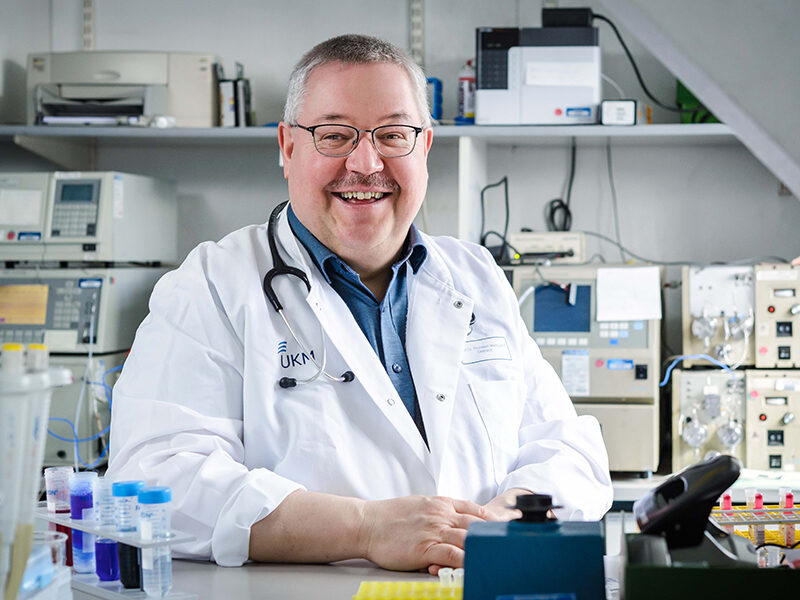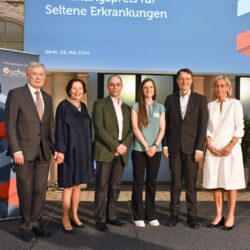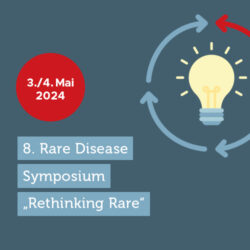Eva Luise Köhler zeichnet Wissenschaftler aus Münster und Regensburg aus
Berlin, im Februar 2021. Für einen vielversprechenden Repurposing-Ansatz zur Behandlung von Mukoviszidose erhalten Prof. Dr. Thorsten Marquardt und Dr. Julien Park vom Universitätsklinikum Münster sowie Prof. Dr. Karl Kunzelmann von der Universität Regensburg den Eva Luise Köhler Forschungspreis für Seltene Erkrankungen 2021. Mit dem Preisgeld in Höhe von 50.000 Euro werden die Forscher untersuchen, inwieweit sich ein bislang zur Behandlung von Bandwürmern zugelassener Wirkstoff sich auch für die Regulation der entgleisten Schleimproduktion bei der Mukosviszidose eignet. Dazu wollen die Wissenschaftler eine Inhalationslösung auf Basis von Niclosamid® entwickeln. Dieser seit Jahrzehnten gut erforschte Wirkstoff, der seit 10 Jahren immer wieder auch für die Krebsbehandlung diskutiert wird, besitzt auch antivirale und antibakterielle Eigenschaften, was ihn zuletzt auch zu einem interessanten Kandidaten für die Behandlung von COVID-19 gemacht hat.
Mukoviszidose, auch „Cystische Fibrose (CF)“ genannt, ist eine angeborene Stoffwechselerkrankung, die auf Mutationen im Gen CFTR beruht. Dieses codiert einen „Cystic Fibrosis Transmembrane Conductance Regulator“ genannten Chloridkanal, der den Salz-Wasser-Haushalt in verschiedenen Organen im Körper im Gleichgewicht hält. Wenn der Chlorid-Kanal nicht richtig funktioniert, entsteht ein zähflüssiger Schleim, der nach und nach lebenswichtige Organe, allen voran die Lunge, verstopft.
Mit rund 8.000 Betroffenen allein in Deutschland gehört Mukoviszidose zu den häufigsten unter den schwerwiegenden Seltenen Erkrankungen. Für einige Mutationen gibt es mittlerweile Behandlungsansätze, aber nicht für alle Patienten stehen am Basisdefekt ansetzende Therapien zur Verfügung. Die Lebenserwartung bei Mukoviszidose ist allgemein noch immer stark verkürzt.
Eine neu entdeckte sehr seltene Krankheit führt zu einer neuen Behandlungsperspektive für ein ganze andere Seltene Erkrankung
Der in Münster entwickelte Therapieansatz beruht in erster Linie auf der Annahme, dass die Blockade eines weiteren Chloridkanals (TMEM16A) zur Verringerung der Schleimproduktion bei Mukoviszidose-Patienten führen könnte. Bei der Entwicklung dieser Arbeitshypothese kam den Münsteraner Ärzten, wie so oft, der Zufall zur Hilfe, wie Thorsten Marquardt erläutert: „Eltern stellten ein wenige Monate altes Mädchen mit einer Gedeihstörung und Bauchproblemen vor, das leider in der Folge verstarb. Wir entdeckten bei ihr und ihrem älteren Bruder eine bis dato unbekannte neue Erkrankung, die zu einem Verlust der TMEM16A-Funktion führte. Die Überraschung: der Verlust von TMEM16A führte auch zu einem Verlust der CFTR- Funktion – ohne jedoch, dass zu diesem Zeitpunkt Symptome der Mukoviszidose auftraten. Da wurden wir natürlich hellhörig – schließlich erlebten wir nicht zum ersten Mal, dass die Neudiagnose einer Seltenen Erkrankung hilft, eine andere besser zu verstehen.“
Nun soll der protektive Effekt der TMEM16A-Hemmung durch die Gabe des Wirkstoffs Niclosamid, der seit vielen Jahrzehnten erfolgreich zur Behandlung von Wurminfektionen eingesetzt wird und diesen Kanal effektiv blockiert, überprüft werden. Im Rahmen einer standortübergreifenden und interdisziplinären Kooperation aus Humanmedizinern, Physiologen und Pharmazeuten soll dazu zunächst ein inhalativ-anwendbares Niclosamid-Molekül entwickelt und sodann im Mausmodell überprüft werden. Sollten sich hier Wirksamkeit und Sicherheit des Therapiekonzeptes bestätigen, könnte es künftig vielen Betroffenen zugutekommen. Besonders für die Betroffenen, die nicht von den CFTR-Modulatoren profitieren, wäre das eine große Chance.
Ärzte und Wissenschaftler arbeiten Hand in Hand
Warum das translationsstarke Forschungsvorhaben nicht nur durch den pragmatischen Repurposing-Ansatz, sondern auch durch seine besondere Patientennähe überzeugen konnte, erläutert Stiftungsvorstand Prof. Dr. Annette Grüters-Kieslich: „Mit Professor Thorsten Marquardt und seinem jungen Kollegen Dr. Julien Park erleben wir zwei Generationen von Ärzten, die das zukunftsweisende Modell des Clinician Scientists in nahezu idealtypischer Weise verkörpern. In ihrer Zusammenarbeit mit Grundlagenforschern beweisen sie, dass erfolgreiche Forschung und Versorgung im Bereich der Seltenen Erkrankungen untrennbar sind und keine institutionellen Grenzen kennen dürfen.“
Der Eva Luise Köhler Forschungspreis für Seltene Erkrankungen wird in Zusammenarbeit mit der Allianz Chronischer Seltener Erkrankungen (ACHSE) e. V. zum 14. Mal vergeben. Pandemiebedingt findet die feierliche Preisverleihung erstmals nicht Ende Februar, im Umfeld des Rare Disease Days, sondern am 17. Juni 2021 in der Berlin Brandenburgischen Akademie der Wissenschaften statt.



